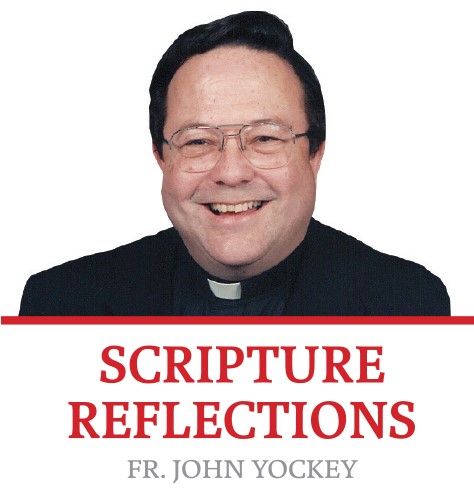Scripture Readings: June 6, 2021
Sunday, June 6, 2021
Exodus 24:3-8
Hebrews 9:11-15
Mark 14:12-16, 22-26
The Most Holy Body and Blood of Christ
I studied graduate theology at the University of Dallas from 1967-70. Every Nov. 22, a memorial service was scheduled downtown to mark the anniversary of President John F. Kennedy’s 1963 assassination. We would gather at Dealey Plaza, where he rode by, look up at the sixth floor of the then school book depository and remember that dreadful, unforgettable occasion.
This annual service was a “memorial,” as we understand the term in our secular culture. We remembered Nov. 22, 1963. We recalled a past, historic event. It stays with us today, deeply riveted in our hearts and minds, but it’s in the past for us to recall emotionally. The historic event is not made present again for us to actually become part of it.
By contrast, a religious “memorial” among ancient people, like the Israelites/Jews and Christians, did just that. The prayer of their gathering not only recalled a defining past (e.g., the original Passover-Exodus experience), but thereby made it present again in the here and now to enable those at home or elsewhere to participate in the event itself (e.g., through a shared Seder meal).
By God’s power, those engaged in a memorial ritual actually participated in the defining high point of their ancestors, even though that historic moment occurred centuries before them.
Our Roman Catholic Church continues this revered awareness at the core of the living, apostolic tradition we’ve received. We bring to the altar of sacrifice our humble gifts of bread and wine, symbols of our daily lives, all that we have and all that we offer.
Each Eucharistic Prayer implores God our Father to consecrate the bread and wine by sending down the Holy Spirit upon them “that they may become for us the Body and Blood of your Son, our Lord Jesus Christ.” (Prayer II)
The “substance,” the material composition of our gifts of bread and wine, is fully transformed and becomes the Real Presence of the once-crucified Christ, now risen and glorified in his humanity. His Passion, Death, Resurrection, Ascension and gift of the Spirit at Pentecost are not re-enacted. They happened once-and-for-all in time and cannot be repeated. (Hebrews 10: 1-18)
But these phases of the one Pascal Mystery of Jesus are made present again by divine grace, re-presented (not re-enacted) at every Mass so that we who “remember” them in sacred ritual may assimilate them ever more deeply into the very fiber of our being.
The “accidents” or visible qualities of bread and wine remain intact after their consecration to show us why Christ is present in his fullness. Emmanuel is with us to literally be our food and drink. There’s nothing figurative about this. We actually eat his divinized Body and drink his divinized Blood.
Jesus offers a unique depth of intimacy in Holy Communion, unlike any other relationship, drawing us more and more, transforming us slowly but surely into the glory that is his.
The annual feast of Holy Thursday remembers the Savior’s abiding gift of himself to his disciples, the institution of the Eucharist at the Last Supper. The Dominican friars of the 13th century, led by St. Thomas Aquinas (d. 1274), promoted Sunday’s feast to encourage us first to adore the Real Presence devoutly, then carry the Lord into our daily lives as prayerfully as we do with a monstrance in solemn procession.
Earlier in the first millennium, St. Augustine (354-430) named the essence of everyday Christian spirituality. He taught his community at Hippo, North Africa: “When you hear ‘The Body of Christ’ addressed to you, you reply ‘Amen.’ Your response is a personal signature, affirming your faith. Then become what you are, the Body of Christ, so that your ‘Amen’ may ring true!” (Sermon 272)
Augustine’s profound insight is right on track. Become what you already are. You were created a unique human being in the Divine Word. You became an adopted son or daughter of the Father by the grace of the Holy Spirit at baptism and confirmation. During your first Holy Communion with Jesus, he called you to become like him, to let his light shine brightly through you every day you’re given.
Now each time you and I consume the Real Presence of our Risen Christ, that call is only strengthened.
The morning paper or evening news often depresses us. Things seem a hopeless mess. We may resist the temptation to tune out completely, but God helps us trust enough not to close in on ourselves and simply keep a safe distance from the challenge.
Debate rages in our public schools over critical race theory. Chaos permeates incredible human suffering at our southern border. Anti-Semitism rears its loathsome head here as well as abroad in the war-weary Middle East.
What is Jesus doing? More specifically, what should Jesus do through you and me? Avoidance behavior/inaction is never his response. The conclusion of President Kennedy’s Inaugural Address reminds us it can’t be ours either.
“Let us go forward to lead … asking his blessing and his help, but knowing that here on earth, God’s work must truly be our own.” (Jan. 20, 1961)

